The city of Nice is located in the heart of the French Riviera, one of the world's most desirable stretches of coast.
Living in Nice comes with all of the cosmopolitan benefits of a French city: excellent food and wine, interesting culture, and beautiful scenery.
But it’s worth getting a fuller picture before you set your heart on Nice as an overseas home.
In this guide, we’ll look at important topics such as the cost of living, the highlights of the expat lifestyle, and some of the best retirement hotspots around Nice.
Secure Peace of Mind with Best-Value International Health Coverage
International Citizens Insurance provide free, no-obligation quotes from the leading international health insurance providers with plans tailored to meet your needs. Trusted by thousands of expats worldwide.
Living in Nice - highlights
Overall, Nice is a good place to live if you appreciate the French lifestyle.
It has all the benefits of inland destinations (good food and excellent wine to go with it) but also has the advantage of being located on the Mediterranean coast.
This makes it a good jumping-off point for other popular European destinations.
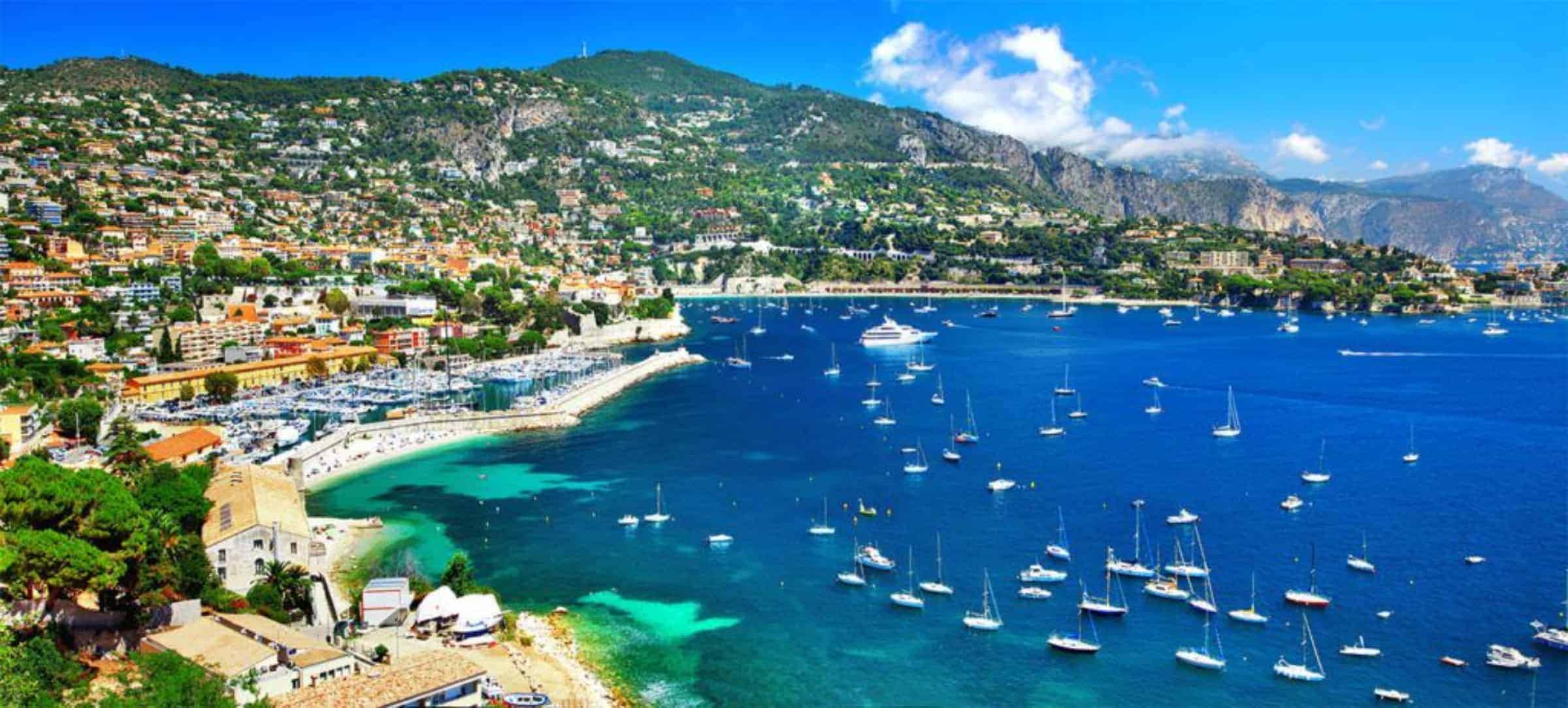
If you’re a traveler, Nice will be a good choice for you. It has its own airport, which has excellent international connections.
Also, you’re not that far away from some celebrity hotspots: Cannes and Monaco, and a short distance from the French Alps.
Another positive of Nice is its moderately low crime rate. The city’s ratings for occurrences such as theft, violent crime, and drug-related crime are all moderate or low.
Residents claim to feel safe walking alone in the city, both during the day and at night.
Living in Nice promises good weather, plenty of opportunities for outdoor activities, and much more. If you’re looking for one of the best French destinations to live for expats with plenty on offer, Nice might be for you.
Moving to Nice, France - what to expect
It’s worth mentioning now that Nice is a tourist hotspot, which brings its own pros and cons. The economy is very seasonally dependent, and things really die off in the winter (although this isn’t always a bad thing).
On a more positive note, Nice has amazing weather. It tops out at around 26 degrees C in the height of summer and drops to around 10 degrees C in the winter.
Locating on the coast means the weather is much more consistent than inland destinations.
The city also offers plenty of local markets and cultural events, such as carnivals and a jazz festival, so it is a great choice for culture lovers.
You can also expect higher property prices than other French locations, but this is due partly to the city’s exclusivity and reputation, but also because of the high number of holiday lets.
Over time, this has impacted the property market for potential buyers.
Living in Nice as an expat
Nice has plenty to offer expats relocating to the area. It is a good place from which you can explore the wider area of the French Riviera.
Nice is a good starting point for this because of its fairly central location.
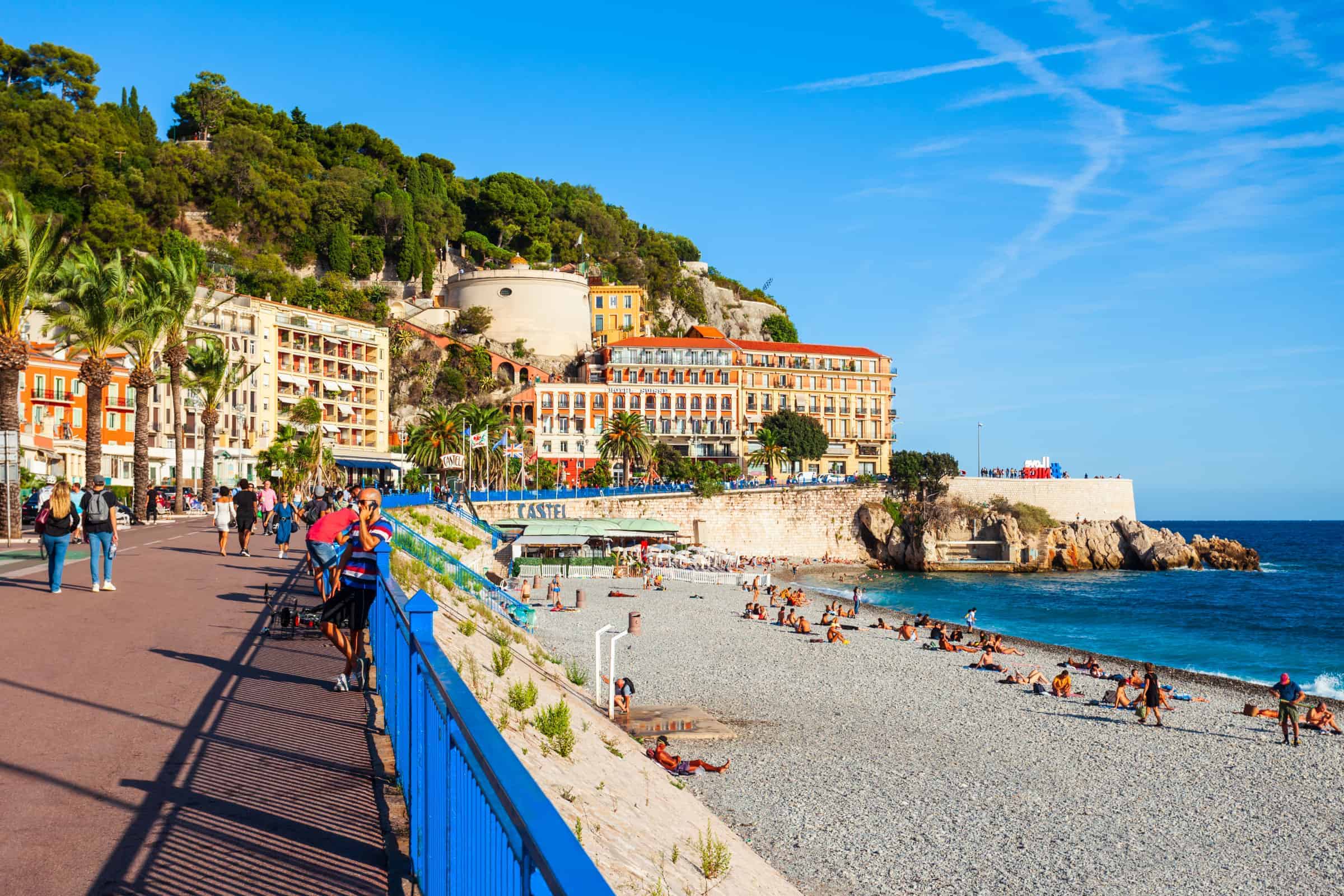
If you’re interested in exploring the Mediterranean, then Nice has you covered. You can get direct ferries to locations such as Corsica, Bastia, Ile Rousse, and many more.
But if you prefer to stay in France, you’ve got plenty of activities to choose from. There are lots of walking and cycling trails in the local countryside, which also gives you the chance to explore local vineyards.
There are also art museums, including Matisse in the city and Picasso in the local town of Antibes, along with local artisans such as glassblowers and painters. Nice, and its surrounding area have plenty to offer art lovers.
It almost goes without saying, but Nice is a good choice if you enjoy good food and wine. The city is home to a lot of traditional French restaurants, but you’ll also see Mediterranean and Italian influences. Expect plenty of seafood and pasta, both of which are atypical in other French cities.
The pros and cons of Nice
Like anywhere else in the world, Nice has plenty to offer expats. But there are some potential drawbacks that are worth considering before you set your heart on retiring here.
Here are the main pros and cons of living in Nice.
The pros
1. Convenient location for travelers
Nice’s location on the French Riviera can’t be overlooked for its convenience. You’re only 90 minutes away from the Alps and close to Cannes, Monaco, and Marseille. Then there’s the Mediterranean and Nice International Airport, which should cover all your bases.
2. The weather is hot, but not too hot
The weather in Nice tops out at a comfortable 26 degrees in the height of summer. You can expect a refreshing breeze from the sea and mild conditions all year round.
What’s more, even the wettest month only sees around ten days of rain, making it a good option for northerners looking for a bit of sunshine.
3. Great healthcare
It’s reassuring to know that healthcare in Nice stands out even in the wider French healthcare system. There are both private and public options, both of which are of a very high standard.
- Healthcare In France For Expats - the French healthcare system, how to access it, and what you need to know about health insurance options.
4. Public transport is good
Public transport in Nice is affordable and reliable, which is saying something for France.
There are trams and buses within the city, but you can also catch a bus all the way to the Italian border! Realistically, you could even get away with not owning a car when living in Nice.
5. Beautiful scenery

Nice as a city holds its own kind of beauty, but it’s almost nothing compared to the wider French Riviera.
If you do decide to buy a car, you could do a lot worse than spending the day driving around the coast exploring its towns and mountains.
- Living In The French Riviera – all the useful information you might need about living in the French Riviera, such as the best retirement destinations, cost of living, and the status of the region’s expat community.
The cons of living in Nice
1. It's a tourist hotspot
Tourism isn’t a con for everyone, but it impacts how a city runs.
Many businesses are orientated towards this section of the economy, so you can know what to expect if you’ve ever been to a tourist hotspot. But you can escape the worst of this by living just outside of town.
2. It’s not entirely French
While Nice is in France, it’s not French in the same way as Paris or Provence. It was part of Italy until 1860, and the influences are obvious.
But you’ll also find traces of North Africa and the Mediterranean too. This isn’t necessarily a con, but if you’re after the authentic French experience, then you might want to rethink.
3. Cost of living
Due to its reputation as a desirable and cosmopolitan city, the cost of living in Nice is higher than elsewhere in France. That said, it’s slightly below the average of other cities on the French Riviera.
Expats and expat groups in Nice
Nice has long been a destination of choice for expats. If you’re thinking of moving here, then it won’t be difficult to strike a balance between authentic local living and integrating with expat communities.
There are plenty of opportunities to make friends with other expats in Nice, but here are some of the biggest organizations:
British Association – Nice branch
The British Association was set up to provide general advice and support to expats new to the area. They hold regular social and fundraising events that are ideal for meeting people.
Nice Expat Meetup Group
This group regularly arranges social meetings for both new and old expats in Nice, making it a great way to socialize with like-minded people. They also list local events and groups so you can develop hobbies and interests.
Professional Yacht Association
While not specific to Nice, the PYA is popular in the city. It’s ideal for those wanting to take advantage of the Mediterranean and offers training and social events.
The cost of living in Nice
If you’re considering retiring to Nice, it’s probably fair to assume you’re not set on a particularly low budget.
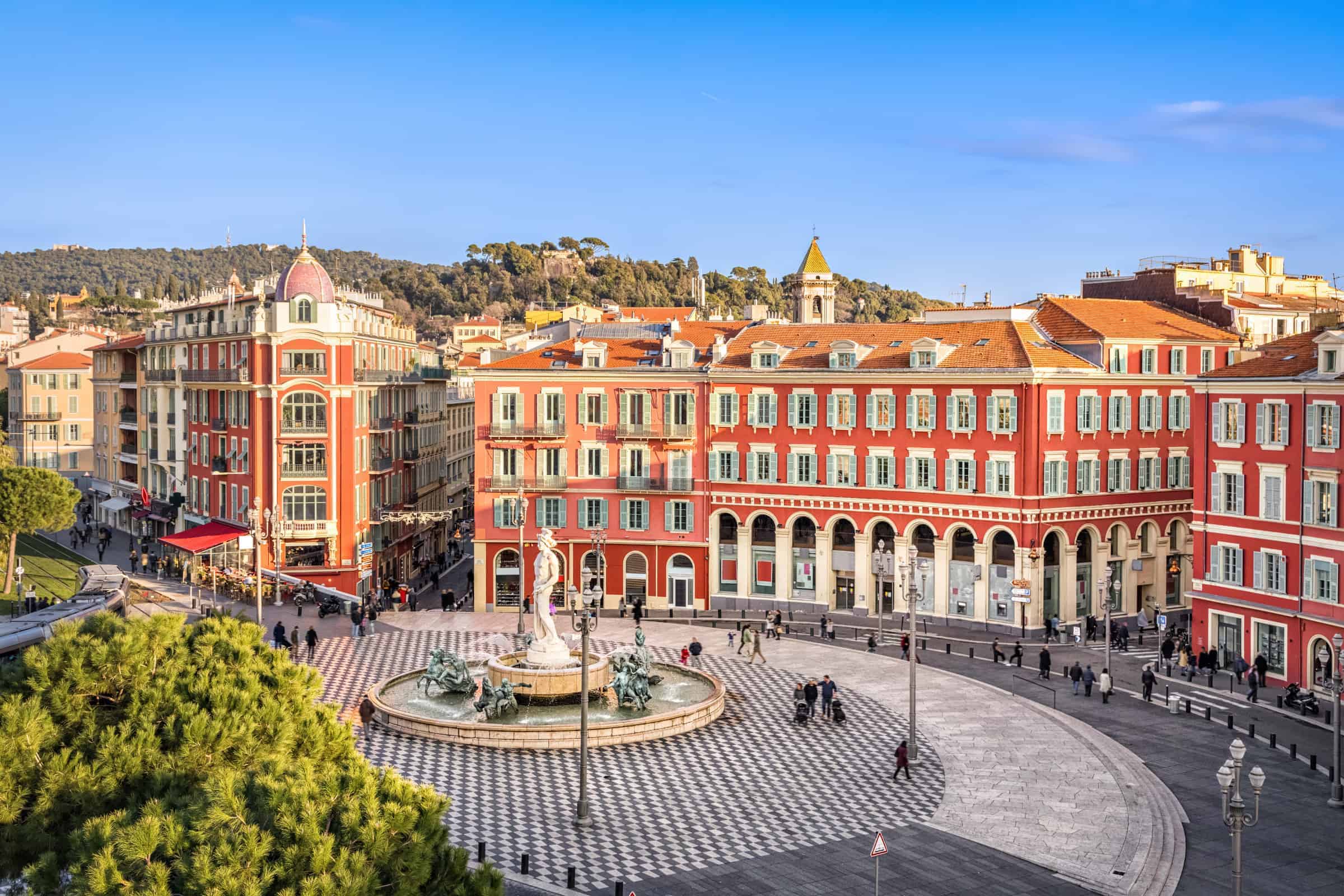
Even so, you might wonder how expensive it is to live in Nice.
Living in Nice is generally cheaper than living in major capital cities of Northern Europe or America. But if you’ve ever been to London or New York, you might know this doesn’t mean much.
Generally speaking, living in Nice will be more expensive than in other French cities, but this is mainly due to its location.
You can get a 3-course meal for two for around €70.
A central 3-bed apartment will cost around €1,800 a month to rent. Buying a central apartment will cost around €6,635 (£5,982) per square meter.
- Renting A Property In France – know the rental procedures and rules in France before signing a French rental contract.
- Buying A Property In France - understand how property purchasing is done in France and avoid mistakes that could cost you dearly in the end.
You might find that grocery prices are quite high in Nice. This is mainly because France is very conscious of food miles, so non-local food is much more expensive.
You can avoid this to a degree by shopping at open-air markets rather than supermarkets.
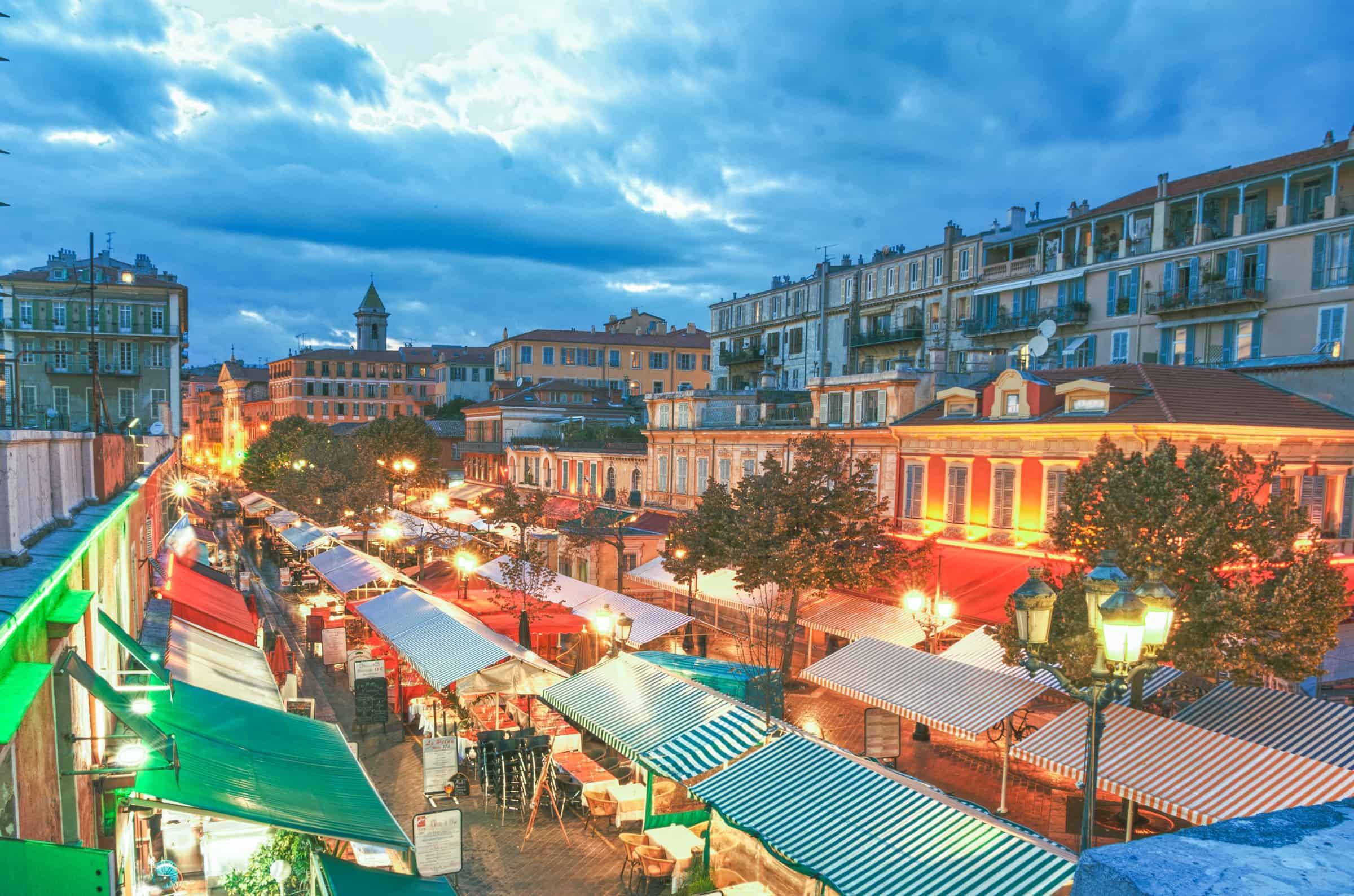
Like anywhere else, living in Nice can cost as much as you budget for.
If you buy a property and want a comfortable life, you’ll probably need around €1,500 a month per person, although couples won’t need to double this amount.
Hobbies and healthcare will add to this cost slightly.
Living in Nice vs. Paris
When people think of moving to France, Paris is probably their first thought. While it offers plenty of great opportunities, is it really the right place to settle down?
Here is a breakdown of living in Nice vs. Paris.
Overall, the cost of living in Paris is 15% higher than in Nice. Paris is an expensive city to live in, arguably more expensive than any British city, including London.
Paris has some great cultural institutions but has the disadvantage of being a very centrally located city. On the other hand, Nice has its own cultural institutions but is located on the coast.
What’s more, there are probably more things to do in the area surrounding Nice. You have loads of exciting cities, and you’re not too far away from the Italian border.
Although it might not be at the top of your list, Nice might be a better location for celeb-spotting than Paris. In Paris, you might come across some of the giants in the fashion world, but your chances of seeing them are probably fairly low.
In Nice, however, you might bump into:
- Bono. The U2 frontman owns a villa in Eze-sur-Mer, not far from Nice.
- Leonardo DiCaprio. The actor is a regular face along the French Riviera and often goes yachting in the Mediterranean.
- Beyoncé. The singer apparently loves the French Riviera and regularly goes on holiday around Saint Tropez.
- Elton John. Elton owns a home on Mount Boron, which overlooks Nice. He’s also a regular at the Cannes Film Festival.
Overall, deciding whether to live in Paris or Nice is entirely subjective. But Paris is a great city to visit as a tourist, while Nice has more to offer for those looking for a permanent destination.
Nice vs. Cannes
Perhaps you’re set on living on the French Riviera but can’t decide between two of its major cities. This will arguably be a more difficult decision than Nice vs. Paris, but here are the facts:
- Cannes is generally regarded as an exclusive beach resort destination with a high-class luxury appearance. Nice, however, is more of an “authentic” city but is also busier.
- Cannes generally has less traffic, and you won’t have an issue walking almost anywhere. In Nice, it’s generally easiest to catch a tram or bus if you’re going somewhere.
- Nice has pebbly beaches along its seafront, whereas the beaches in Cannes are sandy. This isn’t a big issue, but it might make a difference for some.
- Nice arguably has more to do in terms of culture and activities, while Cannes is a good choice if all you want to do is relax.
- Cannes has a higher cost of living than Nice, making it one of the most expensive cities on the French Riviera.
- Both are very tourism-driven cities, but Nice is larger and retains more authenticity, even during peak tourist season.
Deciding whether to live in Nice or Cannes will generally come down to whether you’d prefer a quiet relaxing city with not much going on or a busier one with more potential for activities.
Where to live in Nice
Nice is a city with plenty of variety. It’s got an old town but also several up-and-coming areas with great nightlife. Where you decide to settle down within the city will depend on what kind of lifestyle you want on your doorstep.
Here are some of the best choices for where to live in Nice.
Cimiez
Cimiez is one of the more upper-class areas in Nice and is home to the Matisse Museum. It’s not as busy as some of the more central locations and has a good selection of open spaces for walking. It’s more family-orientated than some other areas.
The Old Town
The Old Town (also known as Vieux-Nice) has plenty to offer for those wanting a more bohemian place to call home. It’s not far from the waterfront and is home to a wide selection of bars and restaurants, and boutique shops. The properties here are, understandably, old, but many have been renovated to a high standard.
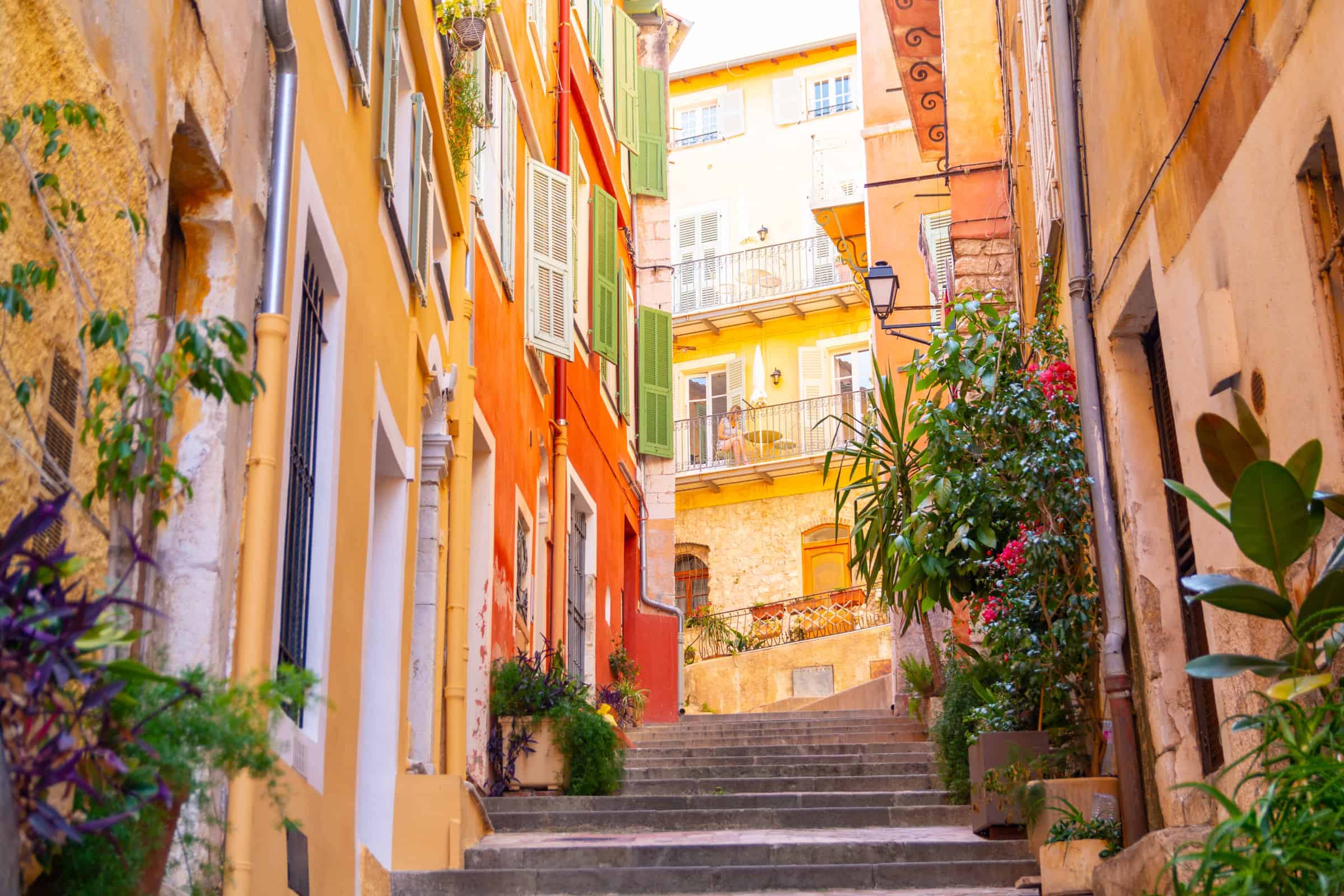
Carre d’Or
Le Carre d’Or, or the Gold Square, is one of the most expensive neighborhoods in Nice. It’s located on the seafront and is home to many of the trendiest boutiques and restaurants. Living here is something of a status symbol in itself.
Mont Boron
Home to the likes of Elton John, Mont Boron is one of the most exclusive areas in the city. It’s obviously hilly, but this guarantees a level of privacy you won’t find in the city itself, and the views are spectacular.
Saint-Roch
Located at the eastern end of the city, Saint-Roch is primarily a residential area. It’s recently been renovated to make it more pedestrian-focused, but the tram still means you can get around quickly and easily.
Final thoughts on living in Nice
Moving to Nice in retirement offers the potential for a very exclusive lifestyle. It's definitely one of the best places to live in France. The quality of living is high, and you’ll have plenty of great locations on your doorstep if you’re a fan of traveling.
But before making your decision, it’s definitely worth considering some of the more realistic points related to living in Nice, such as the impact of tourism and the higher cost of living.
Nice, as well as Cannes, is undoubtfully one of the most expensive destinations in Provence. If the price tag is a bit too high for you, it might be worth considering living somewhere else in Provence where the costs are a bit more manageable.
On the whole, Nice offers plenty as a retirement destination. From great food and wine to museums and art galleries, you won’t run out of things to keep you busy in this vibrant and interesting city.
Other popular expat destinations in France to consider:
- Living In Lyon As An Expat – The Insider Guide
- Discover What It’s Like Living In Toulouse As An Expat
- Living In Montpellier, France
- Living In Bordeaux – The Expats’ Guide
- The Best Neighborhoods In Paris For Expats
You might find useful:
- Living In France Guide – everything you need to know to plan your move and settle down in France
- The Best Places to Live in France – a detailed overview of France’s most popular locations for expats
- Opening A Bank Account In France As An Expat
- Healthcare In France For Expats
- Understanding International Health Insurance: A Comprehensive Guide
Helpful external links:
- Explore markets in Nice.
- See what's on: the main event calendar in Nice - seenice.com.
- For various state services such as the carte de séjour go the prefecture of the Départment Alpes-Maritimes site.
Secure Peace of Mind with Best-Value International Health Coverage
International Citizens Insurance provide free, no-obligation quotes from the leading international health insurance providers with plans tailored to meet your needs. Trusted by thousands of expats worldwide.




